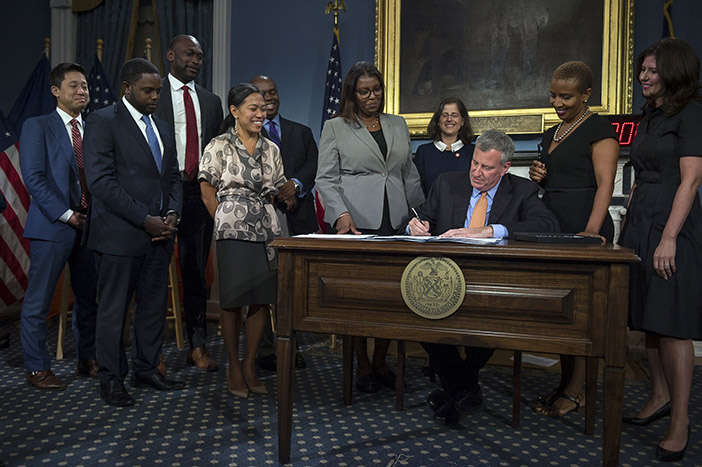Photo Courtesy of Ed Reed/Mayoral Photography Office
Mayor de Blasio recently signed 13 bills into law.
By Michael V. Cusenza
Mayor Bill de Blasio recently signed into law a package of bills aimed at making public safety statistics, in Hizzoner’s words, “even more transparent.”
All four pieces of legislation, which became law last week, call on the City Police Department to improve reporting and analysis of raw information on sex offenses, domestic violence incidents, and hate crimes.
“The data required by these bills will not only deepen our understanding of important public safety issues, but also help us to identify ways to address them,” de Blasio said, prior to signing Intros. 869-A, 948-A, 961-A, and 968-A.
Intro 869-A requires the NYPD to report quarterly on all sex offenses broken down by specific felony or misdemeanor. Intro 948-A requires the NYPD to report monthly, quarterly, semi-annually, and annually on domestic violence; and quarterly and annually on hate crimes.
“The increased reporting of domestic violence incidents, sex crimes, and hate crimes will give every New Yorker a clearer picture of where these crimes occur,” said Council Speaker Melissa Mark-Viverito. “The efforts of the City Council to amend the administrative code of New York to strengthen NYPD reporting on these crimes should be applauded. Reporting on these encounters is a vital step toward increased transparency and identifying where these incidents begin, so that we can potentially stop these crimes before they occur, or provide increased services to the victims in the communities that are becoming most affected.”
Intro 961-A requires the NYPD to report quarterly and annually on intimate-partner domestic violence.
“Last year, there were 8,027 domestic incidents reported in my district – that’s 22 per day, so I feel compelled to work proactively on this issue,” said Councilman Antonio Reynoso (D-Queens and Brooklyn). “Tracking these incidents and distinguishing intimate-partner violence from other types can give us the ability to target services to meet the needs on the ground. [The Mayor’s Office to Combat Domestic Violence] and local organizations, such as the North Brooklyn Coalition Against Family Violence in my district, provide targeted services for intimate partner violence, both for prevention, such as OCDV’s Healthy Relationship Training Academy, and for victim services as well. Data can help us figure out more specifically where outreach about these services is needed. I look forward to a day where we can say that these services are no longer needed because we’ve eradicated domestic violence from the city; but until then, am glad that we can use this information, and the information generated by the other bills in this package, to make sure that needed services reach our communities.”
And Intro 968-A requires the NYPD to report semi-annually and annually on domestic violence in public housing; and quarterly and annually on the percent of reported felony crimes citywide related to domestic violence.
“Domestic violence continues to be a silent act that occurs behind closed doors, with limited information of where it happens and why. Public housing has some of the highest incidents of domestic violence, yet we don’t have a sense of where the incidents happen and how to better allocate resources in order to prevent them,” said Councilman Ritchie Torres (D-Bronx). “This bill will shed a light on where domestic violence incidents are occurring on NYCHA developments and give us more information on DV so that we are able to better address the issue.”

